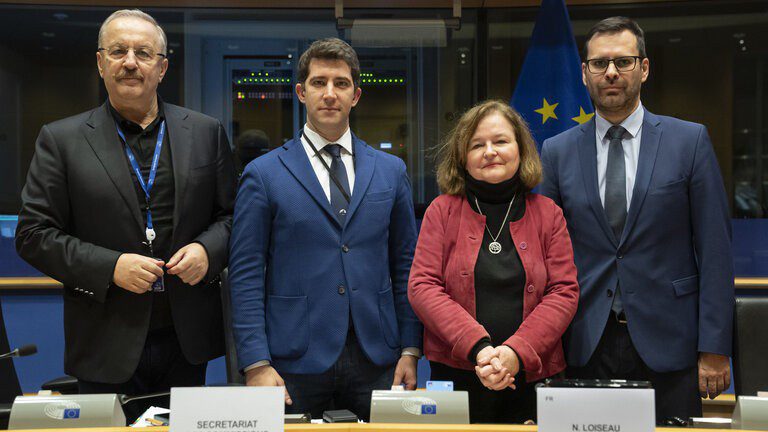
MEPs Csaba Molnár (S&D, HU), Nathalie Loiseau (Renew, FR), Stefano Cavedagna (ECR, IT), and Vasile Dincu (S&D, RO) at the constitutive meeting of EUDS on February 5, 2025
Multimedia Centre of the European Parliament
On Wednesday, February 5th, the European Parliament launched the new special committee known as the “European Democracy Shield” (EUDS), an initiative promoted by Commission President Ursula von der Leyen under the pretext of combating disinformation and protecting the European Union’s democratic institutions.
Despite its claims, the composition of this committee and the political maneuvers behind its formation have sparked fierce criticism from conservatives and sovereigntists, who denounce it as a political exclusion operation and an attempt by Brussels to shield itself against the electoral outcomes it views as undesirable.
Von der Leyen formally proposed the EUDS on May 14, 2024, as part of her campaign for re-election as President of the European Commission. In her speech, she warned about the “growing threat of disinformation” and the “need for a more resilient Europe against hybrid attacks.” However, beneath these arguments lies a clear political strategy: reinforcing control over public debate and limiting the rise of political forces that challenge Brussels’ centralizing model.
The European Democracy Shield will focus on detection – as nothing is more powerful as unveiling information manipulation.
— Ursula von der Leyen (@vonderleyen_epp) May 14, 2024
It will focus on treatment and response, with a stronger approach to deepfakes.
And on resilience and societal immunity as technology evolves. pic.twitter.com/YNja8GjeXX
From its conception, the EUDS has been presented as a tool to counter foreign interference, particularly from Russia and China, and to strengthen the resilience of European institutions against what is now termed “hybrid threats,” a concept that includes information warfare and social media influence.
To date, these threats have also served as justification for laws such as the Digital Services Act (DSA), which grants the EU broad powers to censor content deemed “harmful” to democracy. However, the real issue lies in how “democracy” is defined: in the European context, it appears to refer exclusively to a political ecosystem dominated by the center-right (EPP), socialists (S&D), liberals (Renew), the left, and the greens.
During the 2019-2024 legislature, the EU’s transparency agenda focused on regulating relations between MEPs and lobbyists and promoting greater financial transparency. However, scandals such as Qatargate and the lesser-known but equally significant Moroccogate exposed the hypocrisy of these initiatives. The revelation that foreign-funded lobbyists were influencing EU policy had a significant impact but also exposed the system’s weaknesses.
These transparency efforts alarmed numerous NGOs, many of which receive funding from third countries, prompting a formal complaint to the European Commission. Brussels responded by ensuring that foreign funds could not be used for lobbying, leading to the freezing of €5.4 billion allocated to climate projects. This raises a key question: who has truly influenced European policies beyond China and Moscow?
The composition and allocation of key positions within the EUDS highlight that its true objective may be to consolidate the dominance of pro-establishment parties and marginalize any critical opposition. Nathalie Loiseau, an MEP from the liberal Renew group and a close Macron ally, was selected committee chair even before the actual voting could begin.
At the same time, the vice-chair positions went to the Socialists & Democrats (S&D) and the European People’s Party (EPP). In a predictable but revealing move, no conservative or Eurosceptic party was considered for leadership positions, despite Patriots for Europe (PfE), the third-largest group in Parliament with 86 seats, having proposed candidates.
Portuguese MEP Antonio Tânger Corrêa (PfE) denounced his group’s exclusion, calling the vote a “farce” and an “insult to democracy.” “We were excluded not for lack of merit but purely for ideological reasons,” he stated. Belgian MEP Kathleen Van Brempt (S&D) sharply retorted: “In a democracy, you need a majority. Did you know that? That’s why you didn’t get it.” Her words were met with applause from her colleagues, while frustration grew among right-wing MEPs.
Von der Leyen has justified the creation of the EUDS by citing the need to combat disinformation and the rise of “extremism.” However, this concern appears selectively directed at narratives challenging the status quo. During her speech at the 2024 World Economic Forum in Davos, Von der Leyen emphasized the “danger” of unofficial information that “threatens European stability.”
The Democracy Shield seeks to strengthen surveillance over digital platforms and censor content deemed a “threat” to EU stability. Former Internal Market Commissioner Thierry Breton admitted in a January 9th interview on RMC that the European Commission had “intervened” in Romania’s electoral process and that “they would not hesitate to do the same in Germany if necessary.” Translation: they will intervene if Alternative for Germany (AfD) wins more seats than Brussels deems acceptable.
In this context, European legislation on freedom of expression is more restrictive than in the United States, and the DSA reinforces this trend. “We are witnessing the establishment of a model in which only certain narratives can circulate,” warned a European judicial source. The inconsistency is evident: while the EU boasts of defending press freedom with the Media Freedom Act, it pressures tech companies to modify algorithms in favor of media outlets aligned with its agenda.
The EUDS could become the ultimate mechanism for consolidating power in Brussels and restricting any real opposition, calling into question the very democratic principles it claims to defend.
